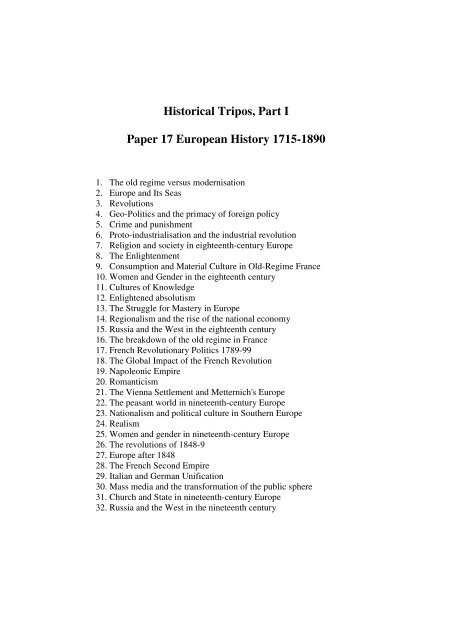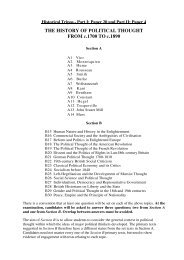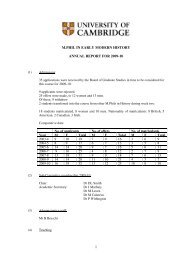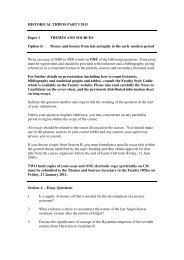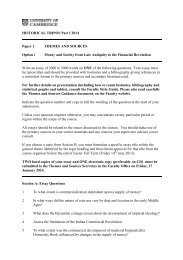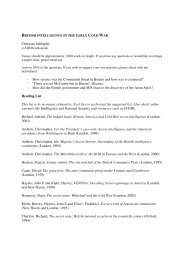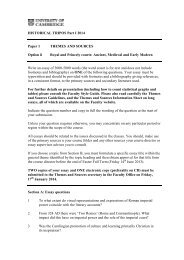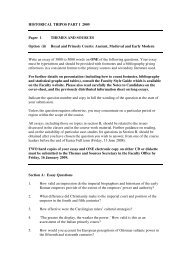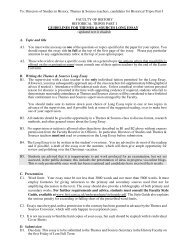Historical Tripos, Part I Paper 17 European History 1715-1890
Historical Tripos, Part I Paper 17 European History 1715-1890
Historical Tripos, Part I Paper 17 European History 1715-1890
Create successful ePaper yourself
Turn your PDF publications into a flip-book with our unique Google optimized e-Paper software.
<strong>Historical</strong> <strong>Tripos</strong>, <strong>Part</strong> I<br />
<strong>Paper</strong> <strong>17</strong> <strong>European</strong> <strong>History</strong> <strong>17</strong>15-<strong>1890</strong><br />
1. The old regime versus modernisation<br />
2. Europe and Its Seas<br />
3. Revolutions<br />
4. Geo-Politics and the primacy of foreign policy<br />
5. Crime and punishment<br />
6. Proto-industrialisation and the industrial revolution<br />
7. Religion and society in eighteenth-century Europe<br />
8. The Enlightenment<br />
9. Consumption and Material Culture in Old-Regime France<br />
10. Women and Gender in the eighteenth century<br />
11. Cultures of Knowledge<br />
12. Enlightened absolutism<br />
13. The Struggle for Mastery in Europe<br />
14. Regionalism and the rise of the national economy<br />
15. Russia and the West in the eighteenth century<br />
16. The breakdown of the old regime in France<br />
<strong>17</strong>. French Revolutionary Politics <strong>17</strong>89-99<br />
18. The Global Impact of the French Revolution<br />
19. Napoleonic Empire<br />
20. Romanticism<br />
21. The Vienna Settlement and Metternich's Europe<br />
22. The peasant world in nineteenth-century Europe<br />
23. Nationalism and political culture in Southern Europe<br />
24. Realism<br />
25. Women and gender in nineteenth-century Europe<br />
26. The revolutions of 1848-9<br />
27. Europe after 1848<br />
28. The French Second Empire<br />
29. Italian and German Unification<br />
30. Mass media and the transformation of the public sphere<br />
31. Church and State in nineteenth-century Europe<br />
32. Russia and the West in the nineteenth century
During the eighteenth and nineteenth centuries, Europe changed more radically than in<br />
any earlier period. That is revealed by the frequent use of the word "revolution" to<br />
describe some of its major events - The French Revolution, the Revolutions of 1848, the<br />
romantic revolution and the industrial revolution. The roots of another great revolution -<br />
the Russian Revolution of 19<strong>17</strong> - stretch back deep into the nineteenth century. Other<br />
changes such as the ‘disenchantment of the world’ by the Enlightenment, the<br />
transformation of the role and position of women, the urbanisation of <strong>European</strong> society,<br />
the rise and fall of Napoleon or the unification of Italy and Germany, were of comparable<br />
scale and importance. Virtually all the movements which formed the modern world -<br />
secularism, liberalism, Marxism, democracy, romanticism, conservatism, modernism,<br />
anarchism, terrorism (to mention just a few) were creations of the eighteenth and<br />
nineteenth centuries. No proper understanding of the world in which we live can be<br />
achieved without knowledge and understanding of these dramatic times. Always one of<br />
the most successful and popular papers in the <strong>Tripos</strong>, <strong>Paper</strong> <strong>17</strong> has been restructured to<br />
provide students with a course of lectures which:<br />
• is coherent in conception<br />
• is comprehensive but concise in coverage<br />
• combines both chronological and conceptual approaches<br />
• is closely related to the examination paper<br />
• is integrated with College supervision<br />
The following reading list covers the main topics of <strong>Paper</strong> <strong>17</strong> on which questions may be set<br />
in the exam. It is not meant to be comprehensive, even in English-language material. On the<br />
other hand, you are not expected to read every item on the list! Supervisors will often propose<br />
their own emphases and alternative readings, and lecturers may hand out more specialized<br />
reading lists at their lectures.<br />
Works which will help you to get a sense of the period and may be read in preparation include:<br />
T.C.W. Blanning (ed.), The Short Oxford <strong>History</strong> of Europe: The eighteenth century (2000)<br />
and The nineteenth century (2000)<br />
T.C.W. Blanning (ed.), The Oxford Illustrated <strong>History</strong> of Modern Europe (1997)<br />
T.C.W. Blanning. The Pursuit of Glory: Europe 1648-1815 (London, 2007)<br />
William Doyle, The Old <strong>European</strong> Order, 2 nd ed. (1992)<br />
Jonathan Sperber, Revolutionary Europe <strong>17</strong>80-1850 (London, 2000)<br />
Norman Stone, Europe transformed 1878-1919, 2 nd ed. (Oxford, 1999)<br />
Please tell your lecturers or your supervisor any suggestions you want to make.<br />
Chris Clark, Convenor of <strong>Part</strong> I <strong>Paper</strong> <strong>17</strong><br />
cmc11@cam.ac.uk<br />
September 2010<br />
2
1 The old regime versus modernisation<br />
William Doyle, The Ancien Régime (London, 1986)<br />
T.C.W. Blanning, The culture of power and the power of culture. Old regime Europe 1660-<br />
<strong>17</strong>89 (Oxford, 2002)<br />
Quentin Skinner, ‘The state’, in Terence Ball, James Farr and Russell L. Hanson (eds.),<br />
Political innovation and conceptual change (Cambridge, 1989)<br />
C.E. Black, The dynamics of modernisation. A study in comparative history (New York,<br />
1966)<br />
Ernest Gellner, Nations and nationalism (Oxford, 1983)<br />
Benedict Anderson, Imagined communities. Reflections on the origins and spread of<br />
nationalism, revised edition (London, and New York, 1991)<br />
Adrian Hastings, The construction of nationhood. Ethnicity, religion and nationalism<br />
(Cambridge, 1997)<br />
T.C.W. Blanning, The Pursuit of Glory: Europe, 1648-1815 (London, 2007)<br />
C.B.A. Behrens, ‘Government and society’, in E. Rich and C. Wilson (eds.), The Cambridge<br />
Economic <strong>History</strong> of Europe, vol. V (1977).<br />
Olwen Hufton, Europe: Privilege and Protest <strong>17</strong>30-<strong>17</strong>89 (1980), Chapters 1-2<br />
H.M. Scott (ed.), The <strong>European</strong> nobilities in the Seventeenth and Eighteenth centuries 2 vols<br />
(1995)<br />
Jonathan Sperber, The <strong>European</strong> Revolutions 1848-1852 (1994), Chapters 1-2.<br />
EJ. Hobsbawm, The Age of Revolution, esp. Chapter 8<br />
E.J. Hobsbawm, The Age of Capital, esp. Chapter 10<br />
Arno J. Mayer, The Persistence of the Old Regime: Europe to the Great War (1981), esp.<br />
Chapter 2<br />
David Blackbourn and Geoff Eley, The Peculiarities of German <strong>History</strong> (1984)<br />
Richard J. Evans, Rethinking German <strong>History</strong> (1987), Chapter 3<br />
Jerome Blum, The End of the Old Order in Rural Europe (1978).<br />
Richard J. Evans and W.R. Lee (eds.), The German Peasantry (1986)<br />
Robert Moeller (ed), Peasants and Lords in Modern German <strong>History</strong> (1987)<br />
Hans Rosenberg. ‘The Pseudodemocratisation of the Junker Class’, in Georg Iggers (ed.), The<br />
Social <strong>History</strong> of Politics (1985)<br />
Hans Rogger, Russia in the Age of Modernisation and Revolution<br />
W.S. Vucinjch (ed.), The Peasant in 19th-century Russia (1968)<br />
Eugen Weber, Peasants into Frenchmen (1977)<br />
Roger Price, A Social <strong>History</strong> of Nineteenth-Century France (1987) Chapter 5<br />
Roger Magraw, France 1815-1914. The Bourgeois Century, Chapter 9<br />
Lucy Riall, The Italian Risorgimento: State, society and national unification (1994),<br />
Chapter 3<br />
Adrian Shubert, A Social <strong>History</strong> of Modern Spain (1990), Chapter 2<br />
2 Eighteenth-Century Europe and Its Seas<br />
Jan Glete, ‘Europe and the Sea’, in ed. Peter H. Wilson A companion to eighteenth-century<br />
Europe (Oxford, 2008)<br />
Jan Glete, Navies and Nations: Warships, Navies, and State Building in Europe and America,<br />
1500-1860, 2 vols. (1993)<br />
Francois Luc, The sea in <strong>European</strong> history (2001)<br />
Martin W Lewis and Karen Wigen, The myth of continents (1997), Intro and Chap 1.<br />
J. G. A. Pocock, ‘What do we mean by Europe?’, The Wilson Quarterly, 21 (1997)<br />
W. H. Parker, ‘Europe: How Far?’, The Geographical Journal, 126 (1960)<br />
3
Paul Butel, The Atlantic (1999), chaps. 4,5,6.<br />
David Kirby, Northern Europe in the Early Modern Period – The Baltic World 1592-<strong>17</strong>72<br />
(1990)<br />
David Kirby, The Baltic World <strong>17</strong>72 – 1993 – Europe’s Northern Periphery in an Age of<br />
Change (1995)<br />
D. Omrod, The Rise of Commercial Empires: England and the Netherlands in the Age of<br />
Mercantilism, 1650-<strong>17</strong>70 (Cambridge, 2003).<br />
Richard Drayton, ‘The globalisation of France: Provincial cities and French expansion c.<br />
1500-1800’, <strong>History</strong> of <strong>European</strong> Ideas, vol. 34 (2008).<br />
Daron Acemoglu, Simon Johnson and James Robinson, ‘The Rise of Europe: Atlantic Trade,<br />
Institutional Change, and Economic Growth, The American Economic Review, 95 (2005)<br />
N. Saul, Russia and the Mediterranean, <strong>17</strong>97-1807 (Chicago, 1970)<br />
David Abulafia, The Mediterranean in history (London, 2003)<br />
Kirby, and Hinkkanen, The Baltic and the North Seas (London 2000)<br />
F. Tabak, The Waning of the Mediterranean 1550-1860 (2008)<br />
Carla Rahn Phillips, ‘Europe and the Atlantic’, in Jack P. Greene and Philip D. Morgan (eds)<br />
Atlantic <strong>History</strong> A Critical Appraisal (OUP, 2009)<br />
3 Revolutions<br />
Jonathan Sperber, Revolutionary Europe, <strong>17</strong>80-1850. Harlow: Longman, 2000<br />
Roy Porter and Mikuláş Teich, eds., Revolution in <strong>History</strong>. Cambridge: Cambridge<br />
University Press, 1986<br />
Jonathan Sperber, The <strong>European</strong> Revolutions, 1848-1851. Cambridge: Cambridge University<br />
Press, 1994<br />
Dieter Dowe, et al., eds., Europe in 1848: Revolution and Reform. New York: Berghahn<br />
Books, 2001<br />
Peter Browning, Revolutions and Nationalities: Europe, 1825-90. Cambridge: Cambridge<br />
University Press, 2000<br />
E. J. Hobsbawm, The Age of Revolution <strong>17</strong>89-1848. London: Weidenfeld and Nicolson, 1962<br />
Albert Boime, Art in an Age of Counter-Revolution, 1815-1848. Chicago: University of<br />
Chicago Press, 2004, especially the chapters on the July Revolution<br />
Elizabeth C. Childs, “The Body Impolitic: Press Censorship and the Caricature of Honoré<br />
Daumier”, in Dean de la Motte and Jeannene M. Przyblyski, eds., Making the News:<br />
Modernity and the Mass Press in Nineteenth-Century France. Amherst: University of<br />
Massachusetts Press, 1999, 43- 81<br />
François Furet and Mona Ozouf, eds., The Transformation of Political Culture <strong>17</strong>89-1848.<br />
Oxford: Pergamon, 1989, 489-503<br />
Paul Schroeder, The Transformation of <strong>European</strong> Politics <strong>17</strong>63-1848. Oxford: Clarendon<br />
Press, 1994<br />
4 Geopolitics and the primacy of foreign policy<br />
i. Primacy of foreign policy theory<br />
Leopold von Ranke, ‘A dialogue on politics’, in Theodor von Laue, ed., Leopold von Ranke,<br />
the formative years (1950)<br />
Brendan Simms, The impact of Napoleon (1997), pp. 2-<strong>17</strong><br />
idem, ‘The return of the primacy of foreign policy’, German <strong>History</strong>, 21 (2003), pp. 275-291<br />
Otto Hintze, The historical essays of Otto Hintze ed. Felix Gilbert (1975), intro, chs. 4 and 5<br />
4
ii. Geopolitics theory<br />
Otto Hintze, The historical essays of Otto Hintze ed. Felix Gilbert (1975), intro, chs. 4 and 5<br />
Gearoid O’Tuathaigh, Simon Dalby and Paul Routledge, eds., The geopolitics reader (1998)<br />
iii. Applications<br />
Brendan Simms, The struggle for mastery in Germany, <strong>17</strong>79-1859 (1998)<br />
Michael Hochedlinger, ‘Whose afraid of the French Revolution? Austrian foreign policy and<br />
the <strong>European</strong> crisis, <strong>17</strong>87-<strong>17</strong>97’, German <strong>History</strong>, 21 (2003), pp. 293-318<br />
Matthias Schulz, ‘A balancing act: domestic pressures and international systemic constraints<br />
in the foreign policies of the great powers, 1848-1851’, German <strong>History</strong>, 21 (2003), pp. 319-<br />
46<br />
iv. Critiques<br />
James J. Sheehan, ‘The primacy of domestic politics: Eckart Kehr’s essays on modern<br />
German history’, Central <strong>European</strong> <strong>History</strong>, 1 (1968), pp. 166-74<br />
Derek Beales and T.C.W. Blanning, ‘Prince Kaunitz and the primacy of domestic policy’,<br />
International <strong>History</strong> Review, 2 (1980), pp. 618-24.<br />
Thomas Ertman, Birth of the Leviathan (1997), introduction<br />
The study of <strong>European</strong> history in the eighteenth and nineteenth centuries was traditionally<br />
dominated by debates about foreign policy and the impact that it had on the evolution both of<br />
the idea of ‘Great powers’ and the internal configuration of states themselves. As classically<br />
stated by Ranke, the primacy of foreign policy has been the subject of intense debate in<br />
intervening years. Criticised by left-leaning scholars, such as Eckart Kehr and Hans-Ulrich<br />
Wehler, it has undergone a mini-revival in recent years. Understanding the general principles<br />
from sections i and ii is an important precursor to assessing the validity of application as<br />
illustrated in section iii and the criticisms levelled at these ideas found in section iv.<br />
5 Crime and punishment<br />
Philippe Ariès, The hour of our death (1981)<br />
Philippe Ariès, Western attitudes toward death (1974) Laura Engelstein, The Keys to<br />
Happiness: sex and the search for modernity in fin-de-siècle Russia (1992)<br />
Richard Evans, Rituals of retribution: capital punishment in Germany, 1600-1987 (1996)<br />
Arlette Farge, Fragile lives: violence, power and solidarity in eighteenth-century Paris<br />
(1993)<br />
Stephen Frank, Crime, cultural conflict, and justice in rural Russia, 1856-1914 (1999)<br />
Thomas Kselman, Death and the afterlife in modern France (1993)<br />
Adele Lindenmeyr, Poverty is not a vice: charity, society, and the state in imperial Russia<br />
(1996)<br />
John Merriman, The margins of city life: explorations on the French urban frontier, 1815-<br />
1851 (1991)<br />
Georges Minois, <strong>History</strong> of suicide: voluntary death in Western culture (1999)<br />
Susan Morrissey, ‘Suicide and civilization in late imperial Russia’, in: Jahrbücher für<br />
Geschichte Osteuropas 43 (1995) pp201-2<strong>17</strong><br />
Susan K. Morrissey, Suicide and the Body Politic in Imperial Russia (Cambridge, 2006)<br />
Joan Neuberger, Hooliganism: crime, culture, and power in St. Petersburg, 1900-1914<br />
(1993)<br />
William Pencak, ‘Foucault Stoned: Reconsidering insanity, and history’ in: Rethinking<br />
<strong>History</strong> 1 (1997) pp34-55<br />
Marc Raeff, The well-ordered police state: social and institutional change through law in the<br />
Germanies and Russia, 1600-1800 (1983)<br />
5
David Ransel, Mothers of misery: child abandonment in Russia (1988)<br />
6 Proto-industrialisation<br />
i. General reading<br />
Ogilvie, S. and Cerman, M. (eds.), <strong>European</strong> Proto-industrialisation (1996)<br />
Mager, W., ‘Proto-industrialization and proto-industry: the uses and drawbacks of two<br />
concepts’, Continuity and Change, 8 (1993), pp.181-216Clarkson, L.A., Protoindustrialization:<br />
the first phase of industrialization? (1985)<br />
Coleman, D.C., ‘Proto-industrialization: a concept too many’, Economic <strong>History</strong> Review, 36,<br />
3 (1983), pp. 435-48<br />
Gullickson, G.L., ‘Agriculture and Cottage Industry: Redefining the Causes of Proto-<br />
Industrialization’, The Journal of Economic <strong>History</strong>, 43, 4 (1983), pp.831-50<br />
Kriedte, P., Medick, H., and Schlumbohm, J. (eds.), Industrialization before Industrialization:<br />
rural industry in the genesis of Capitalism (1982)<br />
Mendels, F., ‘Proto-industrialization, the first phase of the industrialization process’, Journal<br />
of Economic <strong>History</strong>, 32, 1 (1972), pp.241-61<br />
Houston, R. and Snell, K.D.M., ‘Proto-industrialization? Cottage Industry, Social Change and<br />
Industrial Revolution’, <strong>Historical</strong> Journal, 27, 2 (1984)<br />
ii. Case studies<br />
Lewis, G., ‘Proto-Industrialization in France’, The Economic <strong>History</strong> Review, 47, 1 (1994),<br />
pp.150-64<br />
Cerman, M., ‘Proto-industrialization in an urban environment: Vienna, <strong>17</strong>50-1857’,<br />
Continuity and Change, 8 (1993), pp.281-320<br />
Cento Bull, A., ‘Proto-Industrialization, Small-Scale Capital Accumulation and Diffused<br />
Entrepreneurship. The case of the Brianza in Lombardy (1860-1950), Social <strong>History</strong>, 14, 2<br />
(1989), pp.<strong>17</strong>7-200<br />
Isacson, M. and Magnusson, L., Proto-industrialization in Scandinavia (1987)<br />
Melton, E., ‘Proto-Industrialization, Serf Agriculture and Agrarian Social Structure: Two<br />
Estates in Nineteenth-Century Russia’, Past & Present, 115 (1987), pp.69-106<br />
Rudolph, R.L., Agricultural Structure and Proto-Industrialization in Russia: Economic<br />
Development with Unfree Labor’, The Journal of Economic <strong>History</strong>, 45, 1 (1985), pp.47-69<br />
6
iii. Proto-industrialization and demographic changes<br />
Marfany, J., ‘Choices and constraints: marriage and inheritance in eighteenth- and earlynineteenth-century<br />
Catalonia’, Continuity and Change, 21, 1 (2006), pp.73-106<br />
Kriedte, P., Medick, H., and Schlumbohm, J., ‘Proto-industrialization revisited: demography,<br />
social structure, and modern domestic industry’, Continuity and Change, 8 (1993), pp.2<strong>17</strong>-52<br />
Hendrickx, F. M., ‘From weavers to workers: demographic implications of an economic<br />
transformation in Twente (the Netherlands) in the nineteenth century’, Continuity and<br />
Change, 8 (1993), pp.321-55.Gutmann, M., ‘Proto-industrialization and marriage ages in<br />
eastern Belgium’, Annales de Démographie Historique (1987), pp. 143-72<br />
Rudolph, R.L., ‘Family structure and proto-industrialization in Russia’, The Journal of<br />
Economic <strong>History</strong>, 40, 1 (1980), pp.111-18<br />
Braun, R., ‘Proto-industrialization and demographic changes in the Canton Zurich’, in<br />
Charles Tilly (ed.), <strong>Historical</strong> Studies of changing fertility (1978)<br />
Medick, H., ‘The Proto-Industrial Family Economy: The Structural Function of Household<br />
and Family during the Transition from Peasant Society to Industrial Capitalism’, Social<br />
<strong>History</strong>, 1, 3 (1976), pp.291-315<br />
Mendels, F., ‘Industrialization and population pressure in eighteenth-century Flanders’<br />
(dissertation abstract), Journal of Economic history, 31 (1971), pp.269-71<br />
Proto-industrialisation, a concept that refers to the growth of regional rural industries<br />
producing for external markets in the <strong>17</strong> th and 18 th centuries, has generated several theories<br />
discussing its connections with industrialisation, demographic change, and the transition to<br />
capitalism. Section i. explores such theories and their critics. The debate should be<br />
complemented by empirical evidence provided by a wide range of studies for several<br />
<strong>European</strong> regions (section ii). Finally, section iii focuses on the specific links between protoindustrialization<br />
and demographic change.<br />
7 Religion and society in eighteenth-century Europe<br />
W.R. Ward, Christianity under the ancien régime, 1648-<strong>17</strong>89 (Cambridge, 1999)<br />
R. Po-Chia Hsia, The world of Catholic renewal 1540-1 770 (Cambridge, 1998)<br />
W.R. Ward, The Protestant Evangelical Awakening (1985)<br />
J. McManners, Church and Society in 18th-Century France (1998)<br />
J. McManners, Death and Enlightenment (1985)<br />
R. Gawthrop, Pietism and the Making of 18th-Century Prussia (1993)<br />
H. McLeod, Religion and the People of Western Europe (1981)<br />
T.C.W. Blanning, ‘The Role of Religion in Counter-Revolution <strong>17</strong>89-1815’ in D.E.D. Beales<br />
and G. Best (eds.), <strong>History</strong>, Society and the Churches (1985)<br />
H. McLeod, Piety and Poverty. Working-Class Religion in Berlin (1996)<br />
H. McLeod (ed.), <strong>European</strong> Religion in the Age of the Great Cities (1995)<br />
J. McManners, Church and State in France 1870-1914 (1972)<br />
Nigel Aston (ed.), Religious Change in Europe 1650-1914 (1997)<br />
Nigel Aston, Christianity and Revolutionary Europe, c.<strong>17</strong>50-1830 (2002)<br />
Nigel Aston, Art and Religion in Eighteenth-Century Europe (London, 2009)<br />
Owen Chadwick, The Secularisation of the <strong>European</strong> Mind (reissue: 1990)<br />
H. McLeod, Secularisation in Western Europe, 1848-1914 (2000)<br />
Michael Schaich (ed.), Monarchy and Religion: The Transformation of Royal Culture in<br />
Eighteenth-Century Europe (Oxford, 2007)<br />
Michael Burleigh, Earthly Powers: religion and politics in Europe from the French<br />
revolution to the Great War (London, 2006)<br />
Michael J. Sauter, Visions of the Enlightenment : the Edict on Religion of <strong>17</strong>88 and the<br />
politics of the public sphere in eighteenth-century Prussia (Leiden, 2009)<br />
7
Christopher Clark and Wolfram Kaiser, Culture Wars. Catholic-Secular Conflict in<br />
Nineteenth-Century Europe (Cambridge, 2003)<br />
Owen Chadwick, A <strong>History</strong> of the Popes 1830-1914 (Oxford, 1998)<br />
8 The Enlightenment<br />
Dorinda Outram, The Enlightenment, 2 nd edition. Cambridge: Cambridge University Press,<br />
2005.<br />
Robert Darnton, George Washington’s False Teeth: An Unconventional Guide to the<br />
Eighteenth Century. New York: W. W. Norton, 2003<br />
Michel Foucault, “What is Enlightenment?”, in Paul Rabinow, ed., The Foucault Reader: An<br />
Introduction to Foucault’s Thought, London: Penguin, 1991, pp. 32-50<br />
Roy Porter and Mikuláş Teich, eds., The Enlightenment in National Context, Cambridge:<br />
Cambridge University Press, 1981<br />
Richard Butterwick et al., eds., Peripheries of the Enlightenment. Oxford: Voltaire<br />
Foundation, 2008<br />
Charles Withers, Placing the Enlightenment, Chicago and London: University of Chicago<br />
Press, 2007, especially introduction<br />
L. W. B. Brockliss, Calvet’s Web: Enlightenment and the Republic of Letters in Eighteenth-<br />
Century France. Oxford: Oxford University Press, 2002. Introduction<br />
Jonathan Israel, Radical Enlightenment: Philosophy and the Making of Modernity 1650-<strong>17</strong>50.<br />
Oxford: Oxford University Press, 2001<br />
Margaret C. Jacob, Living the Enlightenment: Freemasonry and Politics in Eighteenth-<br />
Century Europe. New York and Oxford: Oxford University Press, 1991.<br />
Margaret C. Jacob, The Enlightenment: A Brief <strong>History</strong> with Documents. Boston: Bedford /<br />
St. Martin’s, 2001.<br />
John Yolton et al., ed., The Blackwell Companion to the Enlightenment, Oxford: Blackwell,<br />
1991<br />
Paul Hyland, ed., The Enlightenment: a sourcebook and reader. London and New York:<br />
Routledge, 2003. Extracts from primary sources.<br />
9 Consumption and Material Culture in Old-Regime France<br />
Hellman, Mimi, ‘Furniture, sociability, and the work of leisure in<br />
eighteenth-century France,’ Eighteenth-century Studies 32 (1999): 415-45.<br />
Berg, Maxine, and Elizabeth Eger, ed. Luxury in the Eighteenth Century:<br />
Debates, Desires and Delectable Goods. Basingstoke: Palgrave Macmillan, 2003,<br />
especially introduction<br />
Roche, Daniel. A <strong>History</strong> of Everyday Things: The Birth of Consumption in<br />
France, 1600-1800. Cambridge: Cambridge University Press, 2000<br />
Pardailhe-Galabrun, Annick. The Birth of Intimacy: Privacy and Domestic Life in<br />
Early Modern Paris. Cambridge: Polity Press, 1991<br />
Fairchilds, Cissie. “The Production and Marketing of Populuxe Goods in<br />
Eighteenth-Century Paris”. In John Brewer and Roy Porter, ed., Consumption and<br />
the World of Goods. London and New York: Routledge, 1992, pp. 228-248<br />
Ribeiro, Aileen. The Art of Dress: Fashion in England and France, <strong>17</strong>50 to 1820.<br />
New Haven: Yale University Press, 1995<br />
Spang, Rebecca Lee. The Invention of the Restaurant: Paris and Modern<br />
Gastronomic Culture. Cambridge, Mass. and London: Harvard University Press,<br />
2000<br />
8
Pennell, Sara. “Consumption and Consumerism in Early Modern England”.<br />
<strong>Historical</strong> Journal 42.2 (1999): 549-564<br />
Breen, T.H. “’Baubles of Britain’: The American and Consumer Revolutions of the<br />
Eighteenth Century”. Past and Present 119 (1988): 73-104<br />
10 Women and gender in the eighteenth century<br />
i. General reading and primary sources<br />
Seidman Trouille, M., Sexual Politics in the Enlightenment: Women Writers Read Rousseau<br />
(1997)<br />
Hufton, O., The Prospect Before Her: a history of women in Western Europe,<br />
1500-1800 (1995)<br />
Fraisse, G. (ed.), A <strong>History</strong> of Women in the West. Vol IV, Emerging Feminism from<br />
Revolution to World War (1995)<br />
Wiesner, M., Women and Gender in Early Modern Europe (1993)<br />
Zemon Davis, N. (ed.), A <strong>History</strong> of Women in the West. Vol III, Renaissance and The<br />
Enlightenment Paradoxes (1993)<br />
Smith, B., Changing Lives: Women in <strong>European</strong> <strong>History</strong> since <strong>17</strong>00 (1989)<br />
Bridenthal, R., Koonz, S. and Stuard, S.M. (eds.), Becoming Visible. Women in <strong>European</strong><br />
<strong>History</strong> (1987)<br />
Bell, S., and Offen, K. (eds.), Women, the Family & Freedom: the debate in documents,<br />
(1983), vol.1 - <strong>17</strong>50-1880.<br />
Rousseau, J.J., Émile, or On Education [original in French, first ed. <strong>17</strong>62]<br />
ii. The Enlightenment and the French Revolution<br />
LaVopa, A., ‘Women, gender, and the Enlightenment: a historical turn’, The Journal of<br />
Modern <strong>History</strong>, 80, 2 (2008)<br />
Taylor, B., and Knott, S. (eds.), Women, gender and Enlightenment (2005)<br />
Bolufer, M. and Morant, I., ‘On women's reason, education and love. Women and Men of the<br />
Enlightenment in Spain and France’, Gender and <strong>History</strong>, 10, 2 (1998), pp. 183-216<br />
Zemon Davies, N., and Farge, A., (eds.) Renaissance and Enlightenment Paradoxes, (1992)<br />
Hufton, O., Women and the Limits of Citizenship in the French Revolution, (1992)<br />
Goodman, D., ‘The Enlightenment Salons: the convergence of female and philosophic<br />
ambitions’, Eighteenth-Century Studies, 22 (1989), 329-50.<br />
Landes, J., Women and the Public Sphere in the Age of the French Revolution (1989)<br />
Godineau, D., The Women of Paris and their French Revolution (1998, original in French<br />
published in 1988)<br />
Rosenfield, L.C., ‘The Rights of Women in the French Revolution’, Studies in Eighteenth<br />
Century Culture, <strong>17</strong> (1987), pp.1<strong>17</strong>-38.<br />
Tomaselli, S., ‘The Enlightenment debate on women’, <strong>History</strong> Workshop Journal, 20,1<br />
(1985), pp.101-24.<br />
Levy, D. et al (eds.), Women in Revolutionary Paris, <strong>17</strong>89-<strong>17</strong>95 (1979)<br />
Abray, J., ‘Feminism in the French Revolution’, American <strong>Historical</strong> Review, 80,1 (1975),<br />
pp.43-62<br />
iii. Society, work and the family<br />
Simonton, D., A <strong>History</strong> of <strong>European</strong> Women’s Work <strong>17</strong>00 to the Present (1998)<br />
Hull, I.V., Sexuality, State, and Civil Society in Germany, <strong>17</strong>00-1815 (1996)<br />
Honeyman, K., and Goodman, J., ‘Women’s work, gender conflict and labour markets<br />
in Europe, 1500-1900’, Economic <strong>History</strong> Review, 44, 4 (1991), pp.608-28<br />
Conner, S.P. ‘Politics, Prostitution, and the Pox in Revolutionary Paris, <strong>17</strong>89-<strong>17</strong>99’, Journal<br />
of Social history, 22, 4 (1989), pp.714-34<br />
9
Gullickson, Gay, Spinners and Weavers of Auffay: Rural industry and the Sexual Division of<br />
Labour in a French Village, <strong>17</strong>50-1850 (1986)<br />
Hufton, O., ‘Women without men: widows and spinsters in Britain and France in the<br />
C18th’, Journal of Family <strong>History</strong>, 9, 4 (1984), pp.355-76<br />
In the eighteenth century, changes in the nature of political thought and education radically<br />
changed the lives of men, but did they also change the lives of women? Section i. explores the<br />
role of women in eighteenth-century Europe; the increasing interest in elaborating the<br />
differences between the sexes; and the ways in which women’s opportunities were at some times<br />
expanded and at others constrained. Section ii. considers the impact of two important<br />
developments –the Enlightenment and the French Revolution- on the rights and duties of<br />
women: did they change women’s status? How did the new philosophical discourse change<br />
women’s behaviour? Did the new political order offer opportunities for women’s involvement in<br />
the public sphere and politics? Section iii. looks at women as workers in the decades prior to<br />
industrialisation, and should serve as a key comparative background to the more dramatic<br />
changes witnessed during the nineteenth century.<br />
11 Cultures of Knowledge<br />
John Sweetman, The Enlightenment and the Age of Revolution <strong>17</strong>00-1850. London:<br />
Longman, 1998<br />
James van Horn Melton, The Rise of the Public in Enlightenment Europe. Cambridge:<br />
Cambridge University Press, 2001<br />
Robert Goldstein, Political Censorship of the Arts and the Press in Nineteenth-century<br />
Europe. Basingstoke: Macmillan, 1989<br />
Peter J. Bowler and Iwan Rhys Morus, Making Modern Science: A <strong>Historical</strong> Survey,<br />
Chicago and London: University of Chicago Press, 2005<br />
Richard Yeo, Encyclopaedic Visions: Scientific Dictionaries and Enlightenment Culture.<br />
Cambridge: Cambridge University Press, 2001<br />
Andrew Cunningham and Nicholas Jardine, eds., Romanticism and the Sciences. Cambridge:<br />
Cambridge University Press, 1990<br />
William F. Bynum, <strong>History</strong> of Medicine: A Very Short Introduction. Oxford: Oxford<br />
University Press, 2008<br />
N. Jardine, J. A. Secord and E. C. Spary, eds., Cultures of Natural <strong>History</strong>, Cambridge:<br />
Cambridge University Press, 1996<br />
Madeleine Pinault, The Painter as Naturalist from Dürer to Redouté, Paris: Flammarion,<br />
1991<br />
R.C. Olby et al., eds., A Companion to the <strong>History</strong> of Modern Science. London: Routledge<br />
1990<br />
12 Enlightened absolutism<br />
H.M. Scott (ed.), Enlightened absolutism: reform and reformers in later eighteenth-century<br />
Europe (Basingstoke, 1990).<br />
Christopher Clark, Iron Kingdom. The Rise and Downfall of Prussia, 1600-1947 (London,<br />
2006)<br />
Peter Wilson, The Holy Roman Empire 1495-1806 Basingstoke, 1999)<br />
Peter Wilson, From Reich to Revolution: German history 1558-1806 (Basingstoke, 2004)<br />
T.C.W. Blanning, Joseph II (London, 1994).<br />
T.C.W. Blanning, Reform and revolution in Mainz, <strong>17</strong>43-1803 (Cambridge, 1974).<br />
10
Derek Beales, Joseph II, Vol. I: In the shadow of Maria Theresa, <strong>17</strong>41-<strong>17</strong>80 (Cambridge,<br />
1987).<br />
C.B.A. Behrens, 'Society, government and the Enlightenment : the experiences of<br />
eighteenth-century France and Prussia' (London, 1985).<br />
C.W. Ingrao, The Habsburg monarchy, 1618-1815, 2 nd edn (Cambridge, 2000).<br />
Marc Raeff, The Well-Ordered Police State. Social and Institutional Change through Law in<br />
the Germanies and Russia, 1600-1800 (New York and London, 1983).<br />
James J. Sheehan, German history <strong>17</strong>70-1866 (Oxford, 1989), <strong>Part</strong> I.<br />
Isabel de Madariaga, Russia in the Age of Catherine the Great (New Haven and London<br />
1981).<br />
Richard Herr, The Eighteenth Century Revolution in Spain (Princeton, 1958)<br />
Kenneth Maxwell, Pombal: Paradox of the Enlightenment (Cambridge, 1995)<br />
Franco Venturi, Utopia and reform in the Enlightenment (Cambridge, 1971).<br />
Franco Venturi, Italy and the Enlightenment: studies in a cosmopolitan century, tr. S. Corsi<br />
(London, 1972).<br />
A. Lentin (ed.), Enlightened absolutism (<strong>17</strong>60-<strong>17</strong>90) : a documentary sourcebook<br />
(Newcastle, 1985).<br />
F. Meinecke, Machiavellism: the doctrine of raison d'état and its place in modern history, tr.<br />
D. Scott (New Haven, 1957). (See essay on Frederick the Great.)<br />
13 The struggle for mastery in Europe, <strong>17</strong>15-<strong>17</strong>92<br />
i. General overviews (entire period)<br />
Derek McKay and H.M. Scott, The rise of the great powers, 1648-1815 (1983)<br />
H.M. Scott, The birth of a great power system (2005), chs 1-8<br />
Andrew C. Thompson ‘Diplomacy and the great powers’ in Peter Wilson, ed., A companion<br />
to C18 Europe (2008)<br />
T.C.W. Blanning, The culture of power and the power of culture (2002)<br />
Chris Clark, Iron Kingdom (2006)<br />
D. Showalter, The wars of Frederick the Great (1996)<br />
Theodor Schieder, Frederick the Great (2000)<br />
Peter Wilson, German armies (1998)<br />
Peter Wilson, The Holy Roman Empire (1999)<br />
Michael Hochedlinger, Austria’s wars of emergence (2003)<br />
Christopher Duffy, Russia’s military way to the west (1981)<br />
International <strong>History</strong> Review, 16 (1994)<br />
ii. Earlier eighteenth century<br />
M.S. Anderson, The war of the Austrian succession (1995)<br />
Walther Mediger, ‘Great Britain, Hanover and the rise of Prussia’, in R.M. Hatton and M.S.<br />
Hatton, eds., Studies in diplomatic history (1970)<br />
Franz A.J. Szabo, The Seven years war in Europe, <strong>17</strong>56-<strong>17</strong>63 (2008)<br />
Matt Schumann and Karl Schweizer, The Seven years war: a transatlantic history (2008)<br />
iii. Later eighteenth century<br />
Paul Schroeder, The transformation of <strong>European</strong> politics, <strong>17</strong>63-1848 (1994)<br />
T.C.W. Blanning, The origins of the French revolutionary wars (1986)<br />
T.C.W. Blanning, The French revolutionary wars (1996)<br />
T.C.W. Blanning, Joseph II (1994)<br />
The course of international relations in the eighteenth century can often seem complicated<br />
11
and uncertain. Most works adopt an essentially narrative approach to the various wars and<br />
changing alliance systems. The framework of events can be easily garnered from these.<br />
However, the more interesting questions turn around the sources of conflict and the changing<br />
nature of the international system. How stable was the eighteenth-century international<br />
system? Did balance of power ideas limit or promote conflict between the powers? What<br />
impact did the rise of Russian and Prussia have on the existing powers? Paul Schroeder is<br />
sceptical about balance of power ideas but his views should be contrasted with the essays in<br />
the special issue of International <strong>History</strong> Review, 16 (1994), produced to mark the<br />
publication of The transformation of <strong>European</strong> politics. The lecture concentrates less on<br />
events and more on understanding the international system of the period.<br />
14 Regionalism and the rise of the national economy<br />
i. General reading and primary sources<br />
Sylla, R., and Toniolo, G., Patterns of <strong>European</strong> Industrialization: The Nineteenth Century<br />
(1993)<br />
Pollard, S., Peaceful Conquest. The industrialization of Europe, <strong>17</strong>60-1970 (1981)<br />
Mathias, P. and Pollard, S. (eds.), The Cambridge Economic <strong>History</strong> of Europe. Vol VIII: The<br />
industrial economies: the development of economic and social policies (1989) [selected<br />
chapters]<br />
Gerschenkron, A., Economic Backwardness in <strong>Historical</strong> Perspective (1962)<br />
Kuznets, S., ‘The State as a Unit in the Study of Economic Growth’, Journal of Economic<br />
<strong>History</strong>, 11 (1951)<br />
List, F., The National System of Political Economy (published in German in 1841)<br />
ii. Regions<br />
Bairoch, P. and Lévy-Leboyer (eds), Regional and International Disparities in Economic<br />
Development Since the Industrial Revolution (1981)<br />
Tipton, F.B., Regional variations in the economic development of Germany during the<br />
nineteenth century (1976)<br />
Eckaus, R.S., ‘The north-south differential in Italian economic development’, Journal of<br />
Economic <strong>History</strong>, 21 (1961)<br />
Clough, S.B., and Livi, C., ‘Economic growth in Italy. An analysis of the uneven<br />
development of North and South’, Journal of Economic <strong>History</strong>, 16 (1956)<br />
iii. The national economy<br />
Pierenkempler, T., and Tilly, R.H., The German Economy during the Nineteenth Century<br />
(2004)<br />
Eddie, S., ‘Economic policy and economic development in Austria-Hungary, 1867-1913’, in<br />
The Cambridge Economic history of Europe (1989), vol. VIII, pp.814-86.<br />
Sánchez-Albornoz, C., The economic modernization of Spain, 1830-1930 (1987)<br />
Gattrell, P.W., The Tsarist Economy, 1850-19<strong>17</strong> (1986)<br />
Lee, W.R., ‘Economic Development and the State in nineteenth-century Germany’,<br />
Economic <strong>History</strong> Review, 41, 3 (1988), pp.346-67.<br />
Kahan, A., ‘Nineteenth century <strong>European</strong> experience with policies of economic nationalism’,<br />
in Johnson, H.G. (ed.), Economic Nationalism in Old and New States (1967)<br />
Freudenberger, H., ‘State intervention as an obstacle to economic growth in the Habsburg<br />
Monarchy’, Journal of economic <strong>History</strong>, 27 (1967), pp.493-509.<br />
Industrialisation in the nineteenth century can be seen as a regional phenomenon: poles of<br />
development coexisted with poles of backwardness in nearly every <strong>European</strong> country. And<br />
yet the nineteenth century also witnessed the rise of the national economy as a central<br />
12
political economy concern, coupled with increasing state intervention to manage and improve<br />
economic conditions. This session explores these two lines of development. Section ii.<br />
focuses on regionalism and duality within countries, and section iii. explores different forms<br />
of state intervention and their consequences for economic growth.<br />
15 Russia and the West in the eighteenth century<br />
John T. Alexander: Catherine the Great. Life and Legend (Oxford 1989)<br />
Isaiah Berlin: Russian Thinkers (New York 1978)<br />
Julie Buckler: Mapping St.Petersburg: Imperial Text and Cityshape (Princeton 2005)<br />
James Cracraft: The Petrine Revolution in Russian Architecture (Chicago, London 1988)<br />
James Cracraft: The Petrine Revolution in Russian Culture (Cambridge/Mass. 2004)<br />
Lindsey Hughes: Russia in the Age of Peter the Great (New Haven, London 1998)<br />
Hans Lemberg: Die nationale Gedankenwelt der Dekabristen (Köln, Graz 1963)<br />
Iurii Lotman: The Semiotics of Russian Cultural <strong>History</strong> (Ithaca 1985)<br />
Isabel de Madariaga: Russia in the Age of Catherine the Great (London 1981)<br />
Martin Malia: Alexander Herzen and the Birth of Russian Socialism (Cambridge/Mass. 1961)<br />
Anatole G. Mazour: The First Russian Revolution, 1825. The Decembrist Movement. 2. ed.<br />
(Stanford 1961)<br />
Catriona Kelly and David Shepherd (eds.) Constructing Russian Culture in the Age of<br />
Revolution: 1881-1940 (Oxford 1998)<br />
Marc Raeff: The Decembrist Movement (Englewood Cliffs 1966)<br />
Marc Raeff: Origins of the Russian Intelligentsia. The Eighteenth-Century Nobility (New<br />
York 1966)<br />
Nicholas V. Riasanovsky: Nicholas I and Official Nationality in Russia, 1825-1855 (Berkeley<br />
et al.1959)<br />
Hans Rogger: National Consciousness in Eighteenth-Century Russia (Cambridge/Mass.<br />
1960)<br />
Theofanis Stavrou (ed.): Art and Culture in Nineteenth-Century Russia (Bloomington 1983)<br />
Franco Venturi: Roots of Revolution (London 1961)<br />
Andrzej Walicki: A <strong>History</strong> of Russian Thought. From the Enlightenment to Marxism<br />
(Stanford 1979)<br />
Andrzej Walicki: The Slavophile Controversy. <strong>History</strong> of a Conservative Utopia in<br />
Nineteenth-Century Russian Thought (Oxford 1975)<br />
Richard Wortman: Scenarios of Power. Myth and Ceremony in Russian Monarchy, 2 vols.<br />
(Princeton 1995/2000)<br />
16 The breakdown of the old regime in France<br />
William Beik, A Social and Cultural <strong>History</strong> of Early Modern France. Cambridge:<br />
Cambridge University Press, 2009<br />
Keith Michael Baker, Inventing the French Revolution: Essays on French Political Culture in<br />
the Eighteenth Century. Cambridge: Cambridge University Press, 1990<br />
Colin Jones, The Great Nation: France from Louis XV to Napoleon. London: Penguin, 2003,<br />
Chapters 5-8<br />
Daniel Roche, France in the Enlightenment. Cambridge, Mass. and London: Harvard<br />
University Press, 1998<br />
Roger Chartier, The Cultural Origins of the French Revolution. Durham and London: Duke<br />
University Press, 1991<br />
French Caricature and the French Revolution, <strong>17</strong>89-<strong>17</strong>99. Chicago: University of Chicago<br />
Press, 1988<br />
13
Henry C. Clark, Compass of society: commerce and absolutism in old-regime France. 2007.<br />
560:6.c.200.26 NF4<br />
John F. Bosher, French Finances <strong>17</strong>70-<strong>17</strong>95: From Business to Bureaucracy. Cambridge:<br />
Cambridge University Press, 1970<br />
Guy Chaussinand-Nogaret, The French Nobility in the Eighteenth Century: From Feudalism<br />
to Enlightenment. Cambridge: Cambridge University Press, 1985<br />
John Shovlin, The Political Economy of Virtue: Luxury, Patriotism, and the Origins of the<br />
French Revolution. Ithaca and London: Cornell University Press, 2006<br />
Sarah Maza, The Myth of the French Bourgeoisie: An Essay on the Social Imaginary <strong>17</strong>50-<br />
1850. Cambridge, Mass. and London: Harvard University Press, 2003<br />
<strong>17</strong> French Revolutionary politics<br />
William Doyle, The French Revolution: A Very Short Introduction. Oxford: Oxford<br />
University Press, 2001<br />
Peter McPhee, Living the French Revolution, <strong>17</strong>89-99. Houndmills: Palgrave Macmillan,<br />
2006<br />
Jack R. Censer and Lynn Hunt, Liberty, Equality, Fraternity: Exploring the French<br />
Revolution. University Park, Pa.: Pennsylvania State University Press, 2001<br />
Paul R. Hanson, Contesting the French Revolution. Chichester: Wiley-Blackwell, 2009<br />
Alan Forrest and Peter Jones, eds., Reshaping France: Town, Country and Region During the<br />
French Revolution. Manchester and New York: Manchester University Press, 1991<br />
Simon Schama, Citizens: A Chronicle of the French Revolution. London: Penguin, 1996<br />
Noel Parker, Portrayals of Revolution: Images, Debates and Patterns of Thought on the<br />
French Revolution. New York: Harvester Wheatsheaf, 1990<br />
Emmet Kennedy, A Cultural <strong>History</strong> of the French Revolution. New Haven and London:<br />
Yale University Press, 1989<br />
Colin Jones, ed., The Longman Companion to the French Revolution. London: Longman,<br />
1999<br />
Philip G. Dwyer and Peter McPhee, eds., The French Revolution and Napoleon: A<br />
Sourcebook. 2002<br />
18 The Global Impact of the French Revolution<br />
Robert Palmer, The Age of the Democratic Revolution (2 vols) (1964)<br />
Hobsbawn, The Age of Revolutions (1973)<br />
Paul W. Schroeder, The Transformation of <strong>European</strong> Politics, <strong>17</strong>63-1848 (1994), <strong>Part</strong> I.<br />
David Armitage and Sanjay Subrahmanyam (eds) The Age of Revolutions in Global Context,<br />
c. <strong>17</strong>60 – 1840 (2010)<br />
Wim Klooster, Revolutions in the Atlantic World – A comparative <strong>History</strong> (2009)<br />
Albertone and De Francesco (eds), Rethinking the Atlantic World – Europe and America in<br />
the Age of Democratic Revolutions (2009), chaps. 11, 12, 13, 14.<br />
Bailey Stone, Reinterpreting the French Revolution A global-historical perspective (2002)<br />
T.C.W. Blanning, The French Revolutionary Wars, <strong>17</strong>82-1802 (London, 1996)<br />
Henrik Horstbøll and Uffe Østergård, ‘Reform and Revolution – The French Revolution and<br />
the Case of Denmark’, Scandinavian Journal of <strong>History</strong> (1990), pp. 155-<strong>17</strong>9.<br />
Jonathan Sperber, Revolutionary Europe, <strong>17</strong>80-1850 (2000), chaps 3 and 9.<br />
Joseph Klaits and Michael H. Haltzel (eds), The Global Ramifications of the French<br />
Revolution (CUP, 1994)<br />
Marcel Dorigny (ed), The Abolitions of Slavery from L. F. Sonthonax to Victor Schoelcher,<br />
<strong>17</strong>93, <strong>17</strong>94, 1848 (UNESCO, 2003), <strong>Part</strong> III.<br />
14
Laurent Dubois and John. D. Garrigus, Slave Revolution in the Caribbean <strong>17</strong>89-1804 (2006),<br />
particularly <strong>Part</strong> I.<br />
T.C.W. Blanning, Reform and revolution in Mainz <strong>17</strong>43-1803 (Cambridge, 1974) <strong>Part</strong> 3<br />
‘Germany and the French Revolution’<br />
T.C.W. Blanning, The French Revolution in Germany. Occupation and resistance in the<br />
Rhineland <strong>17</strong>92-1802 (Oxford, 1983) Conclusion ‘Occupation and resistance in Europe in the<br />
<strong>17</strong>90s’<br />
M. Meriggi, ‘Italy’, in O. Dann and J. Dinwiddy (eds), Nationalism in the Age of the French<br />
Revolution (1988), 199-212.<br />
Nigel Aston, Christianity and Revolutionary Europe, c. <strong>17</strong>50-1830 (2002)<br />
19 The Napoleonic Empire<br />
Geoffrey Ellis, The Napoleonic Empire, 2 nd edition. Houndmills, Basingstoke: Palgrave<br />
Macmillan, 2003<br />
Alexander Grab, Napoleon and the Transformation of Europe. Houndmills, Basingstoke:<br />
Palgrave Macmillan, 2003<br />
Philip G. Dwyer, ed., Napoleon and Europe. Harlow: Longman, 2001<br />
Howard G. Brown and Judith A. Miller, eds., Taking Liberties: Problems of a New Order<br />
from the FR to Napoleon. Manchester: Manchester University Press, 2002<br />
Martyn Lyons, Napoleon Bonaparte and the Legacy of the French Revolution. Basingstoke:<br />
Macmillan, 1994<br />
Alan Forrest and Peter H. Wilson, eds., The Bee and the Eagle: Napoleonic France and the<br />
End of the Holy Roman Empire, 1806. Basingstoke: Palgrave Macmillan, 2008<br />
Charles Esdaile, Napoleon’s Wars. An international history, 1803-1815. London: Penguin,<br />
2007<br />
Donald Sutherland, The French Revolution and Empire: The Quest for a Civic Order.<br />
Oxford: Blackwell, 2003<br />
Rafe Blaufarb, Napoleon: Symbol for an Age. A Brief <strong>History</strong> with Documents. Boston: St.<br />
Martins, 2008<br />
15
20 Romanticism<br />
There are endless possibilities to explore the topic of Romanticism, focusing on the<br />
theoretical surveys about the movement, its manifestations in literature, politics, social and<br />
economic thought, art and music, to name a few. The readings suggested here offer a broad<br />
spectrum of texts on various aspects of Romanticism in different <strong>European</strong> nation-states. The<br />
German and French cases are better known in the Anglophone world, but cases such as the<br />
Spanish, Italian, Greek and Russian should also be approached by students endeavouring to<br />
expand their knowledge of the topic. It is also essential to understand Romanticism that the<br />
student browses through the readings for the topics of the Congress of Vienna and<br />
Restoration and 1848 Revolutions.<br />
Theoretical Approaches<br />
T.C.W. Blanning, ‘The commercialisation and sacralisation of culture’, in T.C.W. Blanning<br />
(ed.), The Oxford Illustrated <strong>History</strong> of Modern Europe<br />
D.G. Charlton (ed.), The French romantics (1984). 2 volumes. Vol 1 (especially both articles<br />
by Charlton); Vol 2 (especially articles by Johnson, Vaughan and MacDonald).<br />
H. Honour, Romanticism (1981), especially Introduction and chapters 1, 2, 5 and 6.<br />
D. A. Keiser, Romanticism, aesthetics and nationalism (CUP, 1999), Introduction, Chapter 1.<br />
A. Lovejoy, “The meaning of romanticism for the historian of ideas,” Journal of the <strong>History</strong><br />
of Ideas 2, no. 3 (June 1941), 257-78. JSTOR<br />
A. Menhennet, The Romantic Movement (1981).<br />
T. Nipperdey, ‘In search of identity: romantic nationalism’, in J.C. Eade (ed.), Romantic<br />
nationalism in Europe (1983), pp. 1-15.<br />
On Literature, Art and Music<br />
G. Abraham (ed), Romanticism (1830-<strong>1890</strong>) (OUP, 1990) [on music], especially chapters 1<br />
(by Abraham) and 3 (by Charlton).<br />
N. Athanassoglou-Kallmyer, “Romanticism: Breaking the Canon”, Art Journal, Vol. 52, No.<br />
2, Romanticism (Summer, 1993), pp. 18-21. JSTOR.<br />
F. Barricelli, ‘Il Concicliatore and Music: a Case of Romantic Oversight’, in L. Peer (ed),<br />
Romanticism across the disciplines (OUP, 1998), pp. 41-53.<br />
A. Ringer (ed.), The early romantic era. Between revolutions: <strong>17</strong>89 and 1848 (London,<br />
1990) [on music].<br />
G. Tomlinson, “Italian Romanticism and Italian Opera: An Essay in Their Affinities”, 19th-<br />
Century Music, Vol. 10, No. 1 (Summer, 1986), pp. 43-60. JSTOR.<br />
On Social and Political Romanticisms<br />
F. C. Beiser (ed.), The Early Political Writings of the German Romantics, (Cambridge, 1996),<br />
especially Novalis’s Pollen and Christianity or Europe, and Schlegel’s Athenaeum<br />
Fragments.<br />
I. Gross, The Scar of Revolution. Custine, Tocqueville, and the Romantic Imagination<br />
(Berkeley, 1991).<br />
D. O. Evans, Social Romanticism in France, 1830-1848 (Oxford, 1951).<br />
J. C. Isbell, Birth of <strong>European</strong> romanticism : truth and propaganda in Staël's 'De<br />
l'Allemagne', 1810-1813 (1995).<br />
739:42.c.95.120 North Wing, Floor 3<br />
E. N. Schamber, Artist as politician: the relationship between the art and the politics of the<br />
French romantics (1984).<br />
W. Veit, ‘Johann Gottlieb Fichte and Romantic Nationalism’, in J. C. Eade (ed), Romantic<br />
nationalism in Europe (1983), pp. 151-64.<br />
16
On Science and Nature<br />
M. Dettelbach, “Alexander von Humboldt between Enlightenment and Romanticism”,<br />
Northeastern Naturalist, Vol. 8, No. 1, pp. 9-20. JSTOR.<br />
T. Fulford, Romanticism and Science, <strong>17</strong>73-1833 (Rutledge, 2002). Introduction.<br />
D. Mosley, ‘Wandering as topic and trope in early 19th century German Culture’, L. Peer<br />
(ed), Romanticism across the disciplines (OUP, 1998), pp. 57-66.<br />
On Specific National Contexts<br />
S. Bann, ‘Romanticism in France’, in R. Porter and M. Teich (eds.), Romanticism in National<br />
Context (1988), pp. 240-59.<br />
R. Beaton, ‘Romanticism in Greece’, in R. Porter and M. Teich (eds.), Romanticism in<br />
National Context (1988), pp. 92-109.<br />
D. Von Engelhardt, ‘Romanticism in Germany’, in R. Porter and M. Teich (eds.),<br />
Romanticism in National Context (1988), pp. 109-133.<br />
S. Kirkpatrick, ‘Romanticism in Spain’, in R. Porter and M. Teich (eds.), Romanticism in<br />
National Context (1988), pp. 260-83.<br />
C. C. Orr, ‘Romanticism in Switzerland’, in R. Porter and M. Teich (eds.), Romanticism in<br />
National Context (1988), pp. 134-71.<br />
N. Saul, The Cambridge companion to German Romanticism (2009), especially articles by<br />
Seyhan, Schmidt, McCarthy, Bowie (2 articles) and De Mazza.<br />
K. Vondung, ‘German Nationalism and the Concept of “Bildung”’, in J. C. Eade (ed),<br />
Romantic nationalism in Europe (1983), pp. 135-150.<br />
D. Tziovas, ‘The novel and the crown: O Leandros and the politics of Romanticism’, in R.<br />
Beaton and D. Ricks (ed), The making of modern Greece: Nationalism, Romanticism, & the<br />
uses of the past (<strong>17</strong>97-1896) (Ashgate, 2009), pp. 211-224.<br />
<strong>History</strong> and the Past<br />
I. DiVanna, Reconstructing the Middle Ages. Gaston Paris and the Development of<br />
Nineteenth-century Medievalism (2008), especially chapters 1 and 2.<br />
M. Harder, “Ex-Conventionnels versus historians of the French Revolution”, in T. Blanning<br />
et al (eds). Historicising the French Revolution (2008), pp. 284-307.<br />
P. Herbst, ‘Myth as the expression of collective consciousness in Romantic nationalism’, in J.<br />
C. Eade (ed), Romantic nationalism in Europe (1983), pp. <strong>17</strong>-32.<br />
B. Keller, The Middle Ages Reconsidered. Attitudes in France from the 18th c through the<br />
Romantic Movement (New York, 1994), especially pp. 85-163.<br />
A. Mitzman, “Michelet and Social Romanticism: Religion, Revolution, Nature”, Journal of<br />
the <strong>History</strong> of Ideas, Vol. 57, No. 4 (Oct., 1996), pp. 659-82. JSTOR.<br />
21 The Vienna Settlement and Metternich's Europe<br />
F.R. Bridge and R. Bullen, The Great Powers and the <strong>European</strong> States System 1815-1914<br />
(1981)<br />
P.W. Schroeder, The Transformation of <strong>European</strong> Politics [chaps 12-<strong>17</strong>] (1994)<br />
M. Broers, Europe After Napoleon (1996)<br />
R.D. Billinger, Metternich and the German Question (1991)<br />
B.P. Simms, The Struggle for Mastery in Germany (1998)<br />
A. Jardin, Restoration and Reaction 1815-1848 (1983)<br />
Robert Alexander, Re-writing the French Revolutionary Tradition: Liberal Opposition and<br />
the Fall of the Bourbon Monarchy (2003)<br />
22 The peasant world in nineteenth-century Europe<br />
<strong>17</strong>
i. General reading and primary sources<br />
Rudolph, R.L. (ed.), The <strong>European</strong> Peasant Family and Society: <strong>Historical</strong> Studies (1995)<br />
Rosener, W., The peasantry of Europe (Blackwell, 1994)<br />
Moulin, Annie, Peasantry and Society in France since <strong>17</strong>89 (1991), caps 1-3<br />
Price, Roger, A Social <strong>History</strong> of Nineteenth Century France (1987), cap. 5<br />
Moeller, R.G., Peasants and Lords in Modern Germany (1986)<br />
Evans, R.J., and Lee, W.R. (eds.), The German Peasantry. Conflict and Community in Rural<br />
Society from the Eighteenth to the Twentieth Centuries (1986)<br />
Blackbourn, David, ‘Peasants and Politics in Germany, 1871-1914’, <strong>European</strong> <strong>History</strong><br />
Quarterly 14 (1984)<br />
Vucinich, W. ed., The Peasant in Nineteenth-Century Russia (1968)<br />
Chaianov, A.V., The Theory of the Peasant Economy (1966)<br />
Schultz, T.W., Transforming Traditional Agriculture (1964)<br />
ii. Land Reform<br />
Simpson, J., Spanish Agriculture: The Long Siesta, <strong>17</strong>65-1965 (2003), part II.<br />
Markoff, J., The Abolition of Feudalism: Peasants, Lords and Legislators in the French<br />
Revolution (1996)<br />
Blum, J., The End of the Old Order in Rural Europe (1978)<br />
Blum, J., ‘The condition of the <strong>European</strong> Peasantry on the Eve of Emancipation’, Journal of<br />
Modern <strong>History</strong>, 46 (1974), pp.395-424.<br />
Weber, E., Peasants into Frenchmen. The Modernization of Rural France (1977).<br />
The great majority of <strong>European</strong> inhabitants in the eighteenth and nineteenth centuries were<br />
peasants, and yet the rural world does not often feature in the accounts of political and<br />
cultural transformations that these centuries witnessed. This session will explore living<br />
conditions in the rural world and the rules that governed rural communities. Rural working<br />
patterns and household structures were dictated by land tenure laws, which eventually also<br />
had a broader impact by dictating the pattern of agricultural specialization and growth. It is<br />
therefore not surprising that the abolition of serfdom and the many land reforms passed in<br />
this period had a profound impact on peasant life and work, as well as on the rural economy,<br />
and this is explored in section ii.<br />
23 Nationalism and political culture in southern Europe<br />
Some general reading<br />
J.A. Davis (ed), Italy in the nineteenth century (Oxford, 2000), chs.1-3, 8.<br />
C. Esdaile, Spain in the Liberal Age: From Constitution to Civil War, 1808-1939 (2000).<br />
R. Herr, The Eighteenth-century Revolution in Spain (1958), conclusion.<br />
S. Woolf, A history of Italy <strong>17</strong>00-1860: The social constraints of political change (1979),<br />
Pt 4.<br />
Some primary sources:<br />
Denis Mack Smith, The making of Italy, <strong>17</strong>96-1866 (1988), chs.1-4.<br />
Alessandro Manzoni, I promessi sposi [The Betrothed] (1827/1842).<br />
José Zorrilla, Don Juan Tenorio (1844).<br />
Italy<br />
A.M. Banti, ‘Public Opinion and Associations in Nineteenth-Century Italy’, in N. Bermeo and<br />
P. Nord (eds), Civil society before democracy: Lessons from Nineteenth-century Europe (2000),<br />
43-60 (see also article by Lyttleton).<br />
18
A. Boime, The Art of the Macchia and the Risorgimento: Representing Culture and nationalism<br />
in nineteenth-century Italy (1993), ch.2.<br />
D.L. Caglioti, ‘Voluntary societies and urban elites in 19 th century Italy’,<br />
(http://www.history.ac.uk/eseminars/sem10.html) or her chapter in G. Morton, B.de Vries and<br />
R.J. Morris (eds), Civil Society, Associations and Urban Places: Class, Nation and Culture in<br />
Nineteenth-Century Europe (2006).<br />
J.A. Davis, ‘The Napoleonic Era in Southern Italy: An Ambiguous Legacy?’, Proceedings of the<br />
British Academy 80 (1993), 133-48.<br />
J.A. Davis, Naples and Napoleon: Southern Italy and the <strong>European</strong> Revolutions, <strong>17</strong>80-1860<br />
(2006).<br />
M. Isabella, ‘Italy, <strong>17</strong>60-1815’, in H. Barker and S. Burrows (ed), Press, politics and the<br />
public sphere in Europe and North America, <strong>17</strong>60-1820 (2002), 201-223.<br />
D. Laven and L. Riall (eds), Napoleon's legacy: problems of government in Restoration Europe<br />
(2000), chs.3, 5, and 14 (chapters by Meriggi, Broers, and Davis).<br />
A. Lyttleton, ‘The middle classes in liberal Italy’, in J. Davis and P. Ginsborg (eds), Society<br />
and politics in the age of the Risorgimento (1991), 63-105.<br />
A. Lyttleton, ‘The National Question in Italy’, in M. Teich and R. Porter (eds), The National<br />
Question in <strong>Historical</strong> Context (1993).<br />
M. Meriggi, ‘Italy’, in O. Dann and J. Dinwiddy (eds), Nationalism in the Age of the French<br />
Revolution (1988), 199-212.<br />
J. Steinberg, ‘The historian and the Questione della Lingua’, in P. Burke and R. Porter (eds),<br />
The social history of language (1987), 198-209.<br />
S. Woolf, ‘Nation, nations, and power in Italy, c.<strong>17</strong>00-1915’, in L. Scales and O. Zimmer<br />
(eds), Power and the nation in <strong>European</strong> history (2005), 295-314.<br />
Spain<br />
Isabel Burdiel, ‘Myths of Failure, Myths of Success: New Perspectives on Nineteenthcentury<br />
Spanish Liberalism’, Journal of Modern <strong>History</strong> 70:4 (1998), 892-912.<br />
R. Carr, Spain, 1808-1975 (2 nd ed., 1986), chs.1-8.<br />
J. Cruz, ‘Building Liberal Identities in Nineteenth-century Madrid: The role of middle class<br />
material culture’, The Americas 60:3 (2004), 391-400 (or<br />
http://muse.jhu.edu/journals/the_americas/v060/60.3cruz.pdf).<br />
J.Cruz,‘Notability and revolution; social origins of the political elite in liberal Spain, 1800 to<br />
1853’, Comparative Studies in Society and <strong>History</strong>, Vol. 36:1 (1994), 97-121.<br />
(or http://www.jstor.org/view/00104<strong>17</strong>5/ap010141/01a00050/0)<br />
J. Cruz, Gentlemen, Bourgeois, and Revolutionaries: Political Change and Cultural<br />
Persistence among the Spanish Dominant Groups, <strong>17</strong>50-1850 (1996).<br />
C. Esdaile, ‘Enlightened absolutism versus Theocracy in the Spanish Restoration, 1814-50’, in Lucy<br />
Riall and David Laven (eds), Napoleon's legacy: problems of government in Restoration Europe<br />
(2000), 65-82.<br />
S. Kirkpatrick, ‘Spanish romanticism’, in R. Porter and M. Teich (eds), Romanticism in National<br />
Context (1988), 260-83.<br />
D. Ringrose, Spain, Europe, and the ‘Spanish Miracle’, <strong>17</strong>00-1900 (1996).<br />
The revolutionary period after <strong>17</strong>89 through to the revolutions of 1848 are rarely connected<br />
by historians of Italy and Spain but it is precisely in this period that the foundations of a<br />
national political culture lay – with the emergence of a modern political language and modern<br />
civil associations. This topic gives students the opportunity to look in closer detail at the<br />
histories of the Italian and Iberian peninsulas in the nineteenth century before the nation-state<br />
and compare them with the rest of Europe. It charts the legacy of the French revolution in<br />
Italy and Spain into the nineteenth century when many of the political possibilities of the late<br />
eighteenth century were discussed, developed, and even played out in the new spaces and<br />
19
places of am emergent national public sphere. While the new themes and forms of national<br />
political culture were developed in the first half of the century, this topic also demonstrates<br />
how local, religious, and civic identities persisted and competed with ideas and<br />
representations of the ‘nation’ to the end of the century.<br />
24 Realism<br />
i. General introductions and background<br />
L. Nochlin, Realism (1971)<br />
L. Nochlin (ed.), Realism and Tradition in Art: Sources and Documents (1966)<br />
C. Rosen, H. Zerner, Romanticism and Realism: The Mythology of Nineteenth-<br />
Century Art (1984)<br />
J. Matlock ‘Censoring the Realist Gaze’ in C. Prendergast, M. Gohen (eds.),<br />
Spectacles of Realism (1995), pp.28-65.<br />
R. Rosenblum and H.W. Janson, Art of the Nineteenth Century: Painting and<br />
Sculpture (1984)<br />
S.F. Eisenmann (ed.), Nineteenth century art: a critical history (1994)<br />
A. Boime, Art in an Age of Civil Struggle, 1848-71 (2007)<br />
J.W. Burrow, The Crisis of Reason: <strong>European</strong> Thought 1848-1914 (2002)<br />
ii. Literature and spectacle<br />
E. Auerbach, Mimesis: The Representation of Reality in Western Literature (1956)<br />
S. Bann, The Clothing of Clio: A Study of the Representation of <strong>History</strong> in Nineteenth-<br />
Century Britain and France (1984)<br />
K. Flint, The Victorians and the Visual Imagination (2000)<br />
C. Gallagher, The Industrial Reformation of English Fiction: Social Discourse and<br />
Narrative from 1832 to 1867 (1985)<br />
F.W.J. Hemmings, Culture and Society in France, 1848-1898: Dissidents and<br />
Philistines (1971)<br />
G. Lukaćs, Studies in <strong>European</strong> Realism (1950)<br />
T. Kontje (ed.) A Companion to German Realism, 1848-1900 (2002)<br />
C. Prendergast, The Order of Mimesis: Balzac, Stendhal, Nerval, Flaubert (1986)<br />
M. Samuels, The Spectacular Past: Popular <strong>History</strong> and the Novel in Nineteenth-<br />
Century France (2002)<br />
K. Tillotson, Novels of the Eighteen-Forties (1954)<br />
M. Vicinus, The Industrial Muse: A Study of Nineteenth-Century Working Class<br />
Literature (1974)<br />
D. Walder (ed.), The Realist Novel (1996)<br />
I. Williams, The Realist Novel in England: A Study of its Development (1974)<br />
iii. Visual arts<br />
M. Agulhon, Marianne into Battle: Republican Imagery and Symbolism in France <strong>17</strong>89-<br />
1880(1981)<br />
A. Boime, The Academy and French Painting in the Nineteenth Century (1971)<br />
M.F. Braive, The Era of the Photograph; A Social <strong>History</strong> (1966)<br />
T.J. Clark, The Painting of Modern Life: Paris in the Art of Manet and his Followers<br />
(1985)<br />
T.J. Clark, The Image of the People: Gustave Courbet and the 1848 Revolution (1973)<br />
T.J. Clark, The Absolute Bourgeois: Artists and Politics in France 1848-51 (1973)<br />
L. Des Cars, The Pre-Raphaelites: Romance and Realism (2000)<br />
M. Fried, Menzel’s Realism: Art and Embodiment in Nineteenth-Century Berlin<br />
(2002)<br />
20
F.D. Klingender, Art and the Industrial Revolution (1966)<br />
P. Mainardi Art and Politics of the Second Empire: The Universal Exhibitions of 1855<br />
and 1867 (1987)<br />
P. Paret, ‘The German Revolution of 1848 and Rethel’s Dance of Death’, R.I. Rotberg and<br />
T.K. Raab (eds), Art and <strong>History</strong>: Images and their Meaning (1986), 233-56.<br />
P. ten-Doesschate Chu, G. Weisberg (eds.), The Popularisation of Images; Visual<br />
Culture under the July Monarchy (1994)<br />
J. Wechsler, A Human Comedy: Physiognomy and Caricature in Nineteenth-Century<br />
Paris (1982)<br />
A turn towards Realism in <strong>European</strong> culture can be detected across a wide range of different<br />
art forms by the mid-nineteenth century. It has also been studied in a variety of different<br />
ways: as a rhetorical tool; as an outgrowth of Romanticism; as an expression of new<br />
technologies of representation; and as a passionate response to urban change and the plight of<br />
the poor. The history of Realism is closely entwined with the hopes and disappointments of<br />
1848, as well as with the crisis afflicting traditional artistic institutions. Section 1 gives lists<br />
the most useful general works to help situate the subject, and clarify how the movement was<br />
understood by its champions and its detractors. Section two examines Realism in literature,<br />
theatre and public life while section three gives readings for painting and visual culture.<br />
25 Women and gender in nineteenth century Europe<br />
i. General reading and primary sources<br />
Clark, L.L., Women and Achievement in Nineteenth-Century Europe (2008)<br />
Fuchs, R.G. and Thompson, E., Women in Nineteenth-century Europe (2004)<br />
Fraisse, G. (ed.), A <strong>History</strong> of Women in the West. Vol IV, Emerging Feminism from<br />
Revolution to World War (1995)<br />
Duby, G., and Perrot, M. (eds.), A <strong>History</strong> of Women in the West, (1994), vol 4.<br />
Smith, B.G., Changing Lives: Women in <strong>European</strong> <strong>History</strong> since <strong>17</strong>00 (1989)<br />
Bridenthal, R., Koonz, S. and Stuard, S.M. (eds.), Becoming Visible. Women in <strong>European</strong><br />
<strong>History</strong> (1987)<br />
Bell, S., and Offen, K. (eds.), Women, the Family & Freedom: the debate in documents,<br />
(1983); vol.1 - <strong>17</strong>50-1880 and vol.2 - 1880-1950<br />
Schneir, M., (ed.), Feminism: the essential historical writings, (1972)<br />
ii. Society, work and the family<br />
Beachy, R., Craig, B. and Owens, A., Women, business and finance in nineteenth-century<br />
Europe: rethinking separate spheres (2006)<br />
Troyanski, D.G., ‘‘I was Wife and Mother’: French Widows Present Themselves to the<br />
ministry of Justice in the Early Nineteenth Century’, Journal of Family <strong>History</strong>, 25, 2 (2000),<br />
pp.202-10.<br />
Simonton, D., A <strong>History</strong> of <strong>European</strong> Women’s Work <strong>17</strong>00 to the Present (1998)<br />
Janssens, A., ‘The Rise and Decline of the Male Breadwinner Family? An Overview of the<br />
Debate’, International Review of Social <strong>History</strong>, 42 (1997), Supplement, pp.1-23<br />
DeGroat, J.A., ‘The public nature of women’s work: definitions and debates during the<br />
Revolution of 1848’, French <strong>Historical</strong> Studies, 20,1 (1997), pp.31-47<br />
Engle, B.A., Between the Fields and the City: Women, Work, and Family in Russia, 1861-<br />
1914 (1996)<br />
Canning, K., Languages of Labor and Gender: Female Factory Work in Germany, 1850-<br />
1914 (1996)<br />
21
Boxser, M.J., ‘Protective Legislation and Home Industry: The Marginalization of Women<br />
Workers in Late Nineteenth-Early Twentieth-Century France’, Journal of Social <strong>History</strong>, 20,<br />
1 (1986), pp.45-65.<br />
Hausen, K., ‘Technical progress and women’s labour in the C19th’, in G. Iggers (ed), The<br />
Social <strong>History</strong> of Politics (1985)<br />
Hausen, K., ‘Family and Role-division: The Polarisation of Sexual Stereotypes in the<br />
Nineteenth Century –an Aspect of the Dissociation of Work and Family Life’, in R. Evans<br />
and W.R. Lee (eds.), The German Family: Essays on the Social <strong>History</strong> of the Family in<br />
Nineteenth and Twentieth-Century Germany (1981)<br />
Dasey, R., ‘Women’s Work and the Family: Women Garment Workers in Berlin and<br />
Hamburg Before the First World War’, in R. Evans and W.R. Lee (eds.), The German<br />
Family: Essays on the Social <strong>History</strong> of the Family in Nineteenth and Twentieth-Century<br />
Germany (1981)<br />
Smith, B., Ladies of the Leisure Class: the bourgeoisies of Northern France in the nineteenth<br />
century, (1981)<br />
McBride. T, ‘The modernisation of women’s work’, Journal of Modern <strong>History</strong>, 49, 2 (1977)<br />
Shorter, E., ‘Women’s work: what difference did capitalism make?’, Theory and Society, 3, 4<br />
(1976), pp.513-27<br />
Scott, J.W., and Tilly, L., ‘Women’s Work and the Family in Nineteenth-Century Europe’,<br />
Comparative Studies in Society and <strong>History</strong>, <strong>17</strong> (1975), pp. 36-64<br />
iii. Women, politics and the public sphere<br />
Allen, A.T., Feminism and Motherhood in Germany, 1800-1914 (1991)<br />
Mills, H., ‘Negotiating the Divide: women, philanthropy and the ‘public sphere’ in<br />
nineteenth-century France’, in F. Tallett & N. Atkin, Religion, Society and Politics in France<br />
since <strong>17</strong>89, (1991), pp.29-54.<br />
Evans, R., Comrades & Sisters: feminism, socialism, pacifism in Europe 1870-1915 (1987)<br />
Rendall, J., The Origins of Modern Feminism: Women in Britain, France and the United<br />
States, (<strong>17</strong>80-1860) (1985)<br />
Moses, C. G., French Feminism in the Nineteenth Century 1984)<br />
During the nineteenth century, <strong>European</strong> women experienced enduring changes in their<br />
working, political and family lives. Section ii. explores the distinctive contribution of women<br />
to the industrial process -the types of work they performed- and how industrialization altered<br />
women’s status and function in the family structure. Section iii. looks at women’s struggles to<br />
overcome the divide between the public and the private sphere through participation in<br />
protests and politics, and eventually through the consolidation of feminist movements.<br />
26 The Revolutions of 1848-9<br />
W. Siemann, The German Revolution of 1848-1849 (Engl trans. 1998)<br />
W. Siemann, ‘The revolutions of 1848-1850)’, in M. Fulbrook (ed.), German <strong>History</strong> Since<br />
1800 (1997)<br />
D.E. Barclay, Frederick William IV and the Prussian Monarchy (1995)<br />
J.J. Sheehan, Germany <strong>History</strong> <strong>17</strong>70-1866 [chapter 11] (1989)<br />
J. Sperber, Rhineland Radicals. The Democratic Movement and the Revolution of 1848<br />
(1991)<br />
J. Sperber, The <strong>European</strong> Revolutions 1848-1851 [chapters 2-5] (1994)***<br />
J. Sperber, ‘Festivals of National Unity in the German Revolution of 1848-9, Past & Present,<br />
36 (1992)<br />
P. Ginsborg, Daniele Manin and the Venetian Revolution (1979)<br />
22
S. Z. Pech, The Czech Revolution of 1848 (1969)<br />
R.J. Rath, The Viennese Revolution of 1848 (1969)<br />
I. Déak, Lajos Kossuth and the Lawful Revolution (1979)<br />
D. Dowe, Europe in 1848: Revolution and reform (Oxford, 2001)<br />
27 Europe after 1848<br />
D. Barclay, Friedrich Wilhelm IV and the Prussian Monarchy 1840-1861 (Oxford, 1995)<br />
A. Plessis, The Rise and Fall of the Second Empire, 1852-1871, trans. Jonathan Mandelbaum<br />
(Cambridge, 1979)<br />
G. Szabad, Hungarian Political Trends between the Revolution and the Compromise (1977)<br />
R.J.W. Evans, 'From Confederation to Compromise: The Austrian Experiment, 1849-1867',<br />
Proceedings of the British Academy, 87 (1994), pp. 135-67<br />
J.M. Brophy, Capitalism, Politics and Railroads in Prussia 1830-1870 (Columbus, 1998), pp.<br />
1-18<br />
R. Price, The French Second Empire. An Anatomy of Political Power (Cambridge, 2001)<br />
C. Tilly, 'The Political Economy of Public Finance and the Industrialization of Prussia 1815-<br />
1866', Journal of Economic <strong>History</strong>, 26 (1966), pp. 484-97<br />
A. Green, Fatherlands. State-Building and Nationhood in Nineteenth-Century Germany<br />
(Cambridge, 2001)<br />
28 The French Second Empire<br />
i. Primary material and general reading:<br />
Bonaparte, Louis Napoléon, Des Idées napoléonéennes (1839) (also available in English)<br />
Tombs, Robert, France 1814-1914 (1996)<br />
Plessis, Alain The Rise and Fall of the Second Empire (1985)<br />
Roger Price, The French Second Empire: An Anatomy of Political Power (2001)<br />
McMillan, James F. Napoleon III (1991)<br />
Anceau, Eric Napoléon III (2008)<br />
ii. Bonapartism: ideas and practice<br />
Rémond, René The Right Wing in France (1969)<br />
Bluche, F. Le Bonapartisme (1980) chap. 11<br />
McMillan, Napoleon III – chapter 9 ‘A modern emperor?’<br />
iii. Domestic policy, propaganda and popularity<br />
Pinckney, David M. Napoleon III and the Rebuilding of Paris (1958)<br />
Truesdell, M. Spectacular Politics: Louis-Napoleon Bonaparte and the Fête Impériale (1997)<br />
Mainardi, Patricia Art and politics of the Second Empire: the universal expositions of 1855<br />
and 1867 (1987)<br />
Menager, Bernard Les Napoléon du peuple (1988) esp. pp 223-57<br />
Corbin, Alain The Village of Cannibals (1992) chap. 1<br />
iv. Foreign policy<br />
Case, Lynn M. Public Opinion on War and Diplomacy during the Second Empire (1954)<br />
Pottinger, E.A. Napoleon III and the German Crisis, 1865-66 (1966)<br />
v. War, collapse and aftermath, 1870-71<br />
Showalter, Dennis The Wars of German Unification (2004) chaps 6-9<br />
Howard, Michael The Franco-Prussian War (1967)<br />
Tombs, Robert The Paris Commune 1871 (1999)<br />
23
The Second Empire of Napoleon III marked a new kind of politics: what has been called<br />
‘active authority and passive democracy’ based on a combination of charismatic leadership,<br />
authoritarian methods, and populist inducements. Long condemned as a criminal regime, its<br />
achievements have recently been taken more seriously. There remains its disastrous end:<br />
misfortune or negligence?<br />
29 Italian and German Unification<br />
L. Riall, The Italian Risorgimento. State, Society and National Unification (1994)***<br />
D. Beales and E. Biagini, The Risorgimento and the Unification of Italy (2002)<br />
H. Hearder, Italy in the Age of the Risorgimento <strong>17</strong>90-1870 (1983)<br />
J. Davis, ‘Remapping Italy’s Path to the 20th Century’, Journal of Modern <strong>History</strong> (1994)<br />
J. Coppa, The Origins of the Italian Wars of Independence (1992)<br />
J. Breuilly, The Formation of the First German Nation-State 1800-1870 (1996)***<br />
O. Pflanze, Bismarck and the Development of Germany, vol. 1: The Period of Unification<br />
(1990)<br />
H. Schulze, The Course of German Nationalism (1991)<br />
W. Carr, The Origins of the German Wars of Unification (1991)<br />
D. Showalter, The Wars of German Unification (2004)<br />
G. Wawro, The Austro-Prussian War (1996)<br />
M. Howard, The Franco-Prussian War (1961)<br />
30 Mass media and the transformation of the public sphere<br />
Jürgen Habermas, The structural transformation of the public sphere. An inquiry into a<br />
category of bourgeois society (Cambridge, 1989)<br />
Craig Calhoun (ed.), Habermas and the public sphere (Cambridge, Mass., and London, 1992)<br />
Hannah Barker, Simon Burrows (eds), Press, Politics, and the Public Sphere in Europe and<br />
North America, <strong>17</strong>60-1820 (Cambridge, 2002)<br />
Jean Chalaby, The Invention of Journalism (New York, 1998)<br />
Dean de la Motte, Jeannene M. Przyblyski (eds), Making the News. Modernity and the Mass<br />
Press in Nineteenth-Century France (Boston, 1999).<br />
Jeremy D. Popkin, Press, Revolution, and Social Identities in France, 1830-1835<br />
(Pennsylvania, 2001)<br />
Abigail Green, Fatherlands. State-Building and Nationhood in Nineteenth-Century Germany<br />
(Cambridge, 2001), Chp. 6.<br />
31 Church and State in late nineteenth century Europe<br />
H. McLeod, Secularisation in Western Europe, 1848-1914 (2000)<br />
H. McLeod, Piety and Poverty. Working-Class Religion in Berlin (1996)<br />
John McManners, Church and State in France, 1870-1914 (1972)<br />
Ralph Gibson, A Social <strong>History</strong> of French Catholicism, <strong>17</strong>89-1914 (1989)<br />
Claude Langlois, ‘Catholics and seculars’, in Pierre Nora, Realms of Memory: The<br />
Construction of the French Past (1996), vol. 1, pp. 109-43<br />
Frank Tallett and Nicholas Atkin, Religion, Society and Politics in France since <strong>17</strong>89 (1991),<br />
chapters 6,7,8<br />
Maurice Larkin, Church and State in France after the Dreyfus Affair (1974)<br />
Adrian Lyttleton, ‘An old church and a new state: Italian anticlericalism 1876-1914’,<br />
<strong>European</strong> Studies Review, 13,2 (1983)<br />
24
Christopher Clark and Wolfram Kaiser, Culture Wars. Catholic-Secular Conflict in<br />
Nineteenth-Century Europe (Cambridge, 2003)<br />
32 Russia and the West in the nineteenth century<br />
John T. Alexander: Catherine the Great. Life and Legend (Oxford 1989)<br />
Isaiah Berlin: Russian Thinkers (New York 1978)<br />
Julie Buckler: Mapping St.Petersburg: Imperial Text and Cityshape (Princeton 2005)<br />
James Cracraft: The Petrine Revolution in Russian Architecture (Chicago, London 1988)<br />
James Cracraft: The Petrine Revolution in Russian Culture (Cambridge/Mass. 2004)<br />
Lindsey Hughes: Russia in the Age of Peter the Great (New Haven, London 1998)<br />
Hans Lemberg: Die nationale Gedankenwelt der Dekabristen (Köln, Graz 1963)<br />
Iurii Lotman: The Semiotics of Russian Cultural <strong>History</strong> (Ithaca 1985)<br />
Isabel de Madariaga: Russia in the Age of Catherine the Great (London 1981)<br />
Martin Malia: Alexander Herzen and the Birth of Russian Socialism (Cambridge/Mass. 1961)<br />
Anatole G. Mazour: The First Russian Revolution, 1825. The Decembrist Movement. 2. ed.<br />
(Stanford 1961)<br />
Catriona Kelly and David Shepherd (eds.) Constructing Russian Culture in the Age of<br />
Revolution: 1881-1940 (Oxford 1998)<br />
Marc Raeff: The Decembrist Movement (Englewood Cliffs 1966)<br />
Marc Raeff: Origins of the Russian Intelligentsia. The Eighteenth-Century Nobility (New<br />
York 1966)<br />
Nicholas V. Riasanovsky: Nicholas I and Official Nationality in Russia, 1825-1855 (Berkeley<br />
et al.1959)<br />
Hans Rogger: National Consciousness in Eighteenth-Century Russia (Cambridge/Mass.<br />
1960)<br />
Theofanis Stavrou (ed.): Art and Culture in Nineteenth-Century Russia (Bloomington 1983)<br />
Franco Venturi: Roots of Revolution (London 1961)<br />
Andrzej Walicki: A <strong>History</strong> of Russian Thought. From the Enlightenment to Marxism<br />
(Stanford 1979)<br />
Andrzej Walicki: The Slavophile Controversy. <strong>History</strong> of a Conservative Utopia in<br />
Nineteenth-Century Russian Thought (Oxford 1975)<br />
Richard Wortman: Scenarios of Power. Myth and Ceremony in Russian Monarchy, 2 vols.<br />
(Princeton 1995/2000)<br />
25


